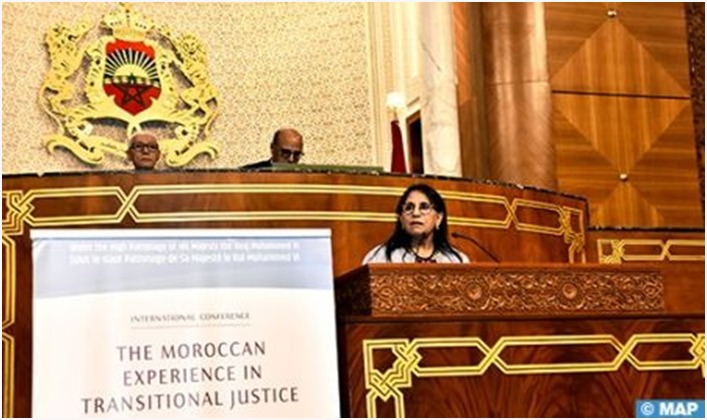Transitional Justice in Morocco Led to Unique, Ground-Breaking Experience – HM the King

His Majesty King Mohammed VI sent a Message to the participants in the International Symposium on “Transitional Justice”, opened Friday in Rabat, in which the Sovereign underlined the role of the Equity and Reconciliation Commission (IER) as an essential pillar of democratic construction and transition, which has notably contributed to the consolidation of the rule of law and institutions and the protection of freedoms in Morocco.
The sovereign decision to create this body “was part of a proactive dynamic of public affairs management, inspired by a new concept of authority and giving precedence to the principle of correlation between responsibility and accountability for institutions”, stressed the Sovereign, noting that “the ultimate challenge was none other than the preservation of the dignity of all Moroccans”.
“In addition to a fully recovered national reconciliation and the correction of past violations, this dynamic intended to make transitional justice one of the priorities of the choice of democratic transition that was made at the time,” continued HM the King in this Message, which was read by the President of the National Human Rights Council, Amina Bouayach.
The Sovereign assured, in this context, that in favor of the recommendations of the IER, formulated in the form of proposals relating to public policies, and in addition to the emphasis placed on the necessary strengthening of the constitutional protection of human rights, a regulatory framework has been put in place to structure vast societal reforms, including those of a constitutional and legislative nature.
Furthermore, consultation bodies and institutional mechanisms have been created to break with the violations perpetrated in the past, to establish a mode of public governance based on the rules of the State of law, to highlight the constant evolution of societal dynamics, added HM the King, noting that He had insisted, in this perspective, on the reflection in the Constitution, laws and public policies, of the broadest acceptance of human rights, which covers all political, environmental, economic, social and cultural aspects.
“We have also created the institutions and constitutional mechanisms necessary for the protection of human rights in their multiple dimensions,” said the Sovereign in this Message, recalling His personal attachment “to ensuring that the concept of spatial justice finds a concrete translation in development policies, and that the notion of reparation for collective harm is integrated into our development plans.”
“We have also ensured that, as far as possible and necessary, the regions and areas that did not benefit from the fruits of the development and growth achieved by the Kingdom of Morocco were removed from marginality,” observed HM the King, considering that the way was thus opened to major reconciliations with History and with space.
And the Sovereign specified that this resolute will has enabled a certain number of regions of Morocco which had a great deficit of development to remedy it, stressing that some of them have even become a model of spatial development.
“In this context, today, the world, through the voice of impartial observers, bears witness to the fruits of the development model that is at work in our Southern Provinces, and which is intended to be in total agreement with the ideal of solidarity, complementarity and spatial justice prevailing between the different regions of the Kingdom,” said HM the King, specifying that “the physiognomy of Our recovered Provinces has changed for the better, thus allowing them to become an attractive area for investments, where today there are an abundance of development projects, large installations and major equipment.”



